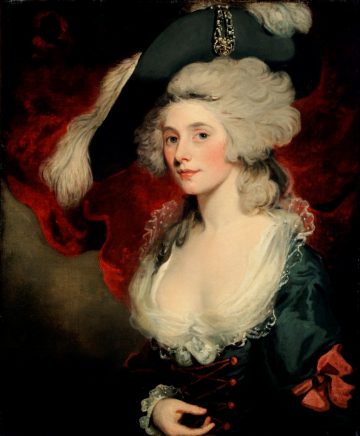

Author: Dacre, Charlotte [Charlotte King][ (b. 1782)
Title: Tales of Helicon
Date: 1798
Descriptive and Critical Essay
The poems collected in Trifles of Helicon are informally organized into different sections, beginning with sonnets. The sisters, Charlotte and Sophia, take turns as they experiment with the basic format of a sonnet; the poems range from 8 to 16 lines, but never use the conventional 14. In these sonnets the sisters discuss their muses, and their thoughts on subjects such as love, meditation, aging and sleep; each poem is signed with the name of the authoring sister. One sonnet written by Charlotte King, The Invocation to Sleep, uses a common theme for Romantic Era British women poets, which is sleep and the love of escape and dreams:
Oh, Sleep! kind god, approach thy gentle wand,
And strew they poppies round my aching head,
Lay on my lids thy soft composing hand,
And pour thy brightest visions round my head.‘Tis thou alone canst hush in sweetest peace,
Lull the loud sigh, and stay the starting tear;
In calmness bid each stormy passion cease,
Close the sad lid, and hush each anxious fear.Then come, kind god, and chase my cares away,
Sooth the poor flutterer of my beating breast,
With hagard Misery one moment stay,
Nor fly, thus scornful, from a wretch distrest.
From the title the reader knows she is asking Sleep for help, and throughout the poem it is clear that sleep is the only time she is able to relax, reveling in the dreams. With her rocky childhood, having her parents’ divorce and her father’s consistent criminal activity, it comes as no surprise she is familiar with stress and anxiety.
Through the bulk of the verse the sisters continue to take turns, though Sophia begins to constitute a smaller grouping inside the collection. These two smaller collections come in a two part, and a four part section; each group is related to the others. The first of these include the poems, Love and Pain and Apathy, while the second set is titled Flight of Imagination, with four short verse poems called, Air, Fire, Earth, and Water, each dealing with one of the four elements. All the while Charlotte is woven in between following her own pattern of selecting a topic, then writing about the opposite during her next turn. Using verse, Charlotte writes about War, then Peace, next Morning, then Evening.
A closer look at War and Peace reveals Charlotte’s belief that families happily send their men off to fight, “To gain, or death, or glory, in the field” (War 14), understanding completely the possibility of death, yet hoping for glorification. She ends the poem by saying, “The widow’s tears must wet the harden’d ground” (War 17), as if it is the women’s job to soften the earth once the men have finished with their destruction. To complement this poem Charlotte’s next entry, Peace, speaks to the notion that regardless whether war ends or not there will never truly be peace. She claims Discord, Faction, Havoc, Confusion, Ruin, Famine, and Misery mock peace, and that they will never stop their disruptions.
After the informal verse portion of the collection, Sophia takes to writing ballads; Charlotte wrote one ballad, but used her pages to return to sonnets, once again, completely ignoring all fundamental, conventional rules for writing them. Once Sophia is finished, they return to “normal” verse poetry, allowing a slow build up to Charlotte’s collection-ending epic, Edmund and Anna: A Legendary Tale.
Written using an alternate rhyming scheme, and a dark narrative voice and tale, Edmund and Anna: A Legendary Tale evokes memories of the classics. It follows the tale of a young women who secretly walks through the woods, believing that she is receiving a premonition from an owl that the lover she is going to visit has bad news. Eventually, Anna reaches a prison into which she awaits a guard to admit her and to lead her to her lover. After describing Anna’s slow and painful walk to Edmund’s cell, Charlotte describes in detail the chains that bound him to the floor and the walls which imprisoned him. Once alone, they speak as though Edmund will not be freed and so he reveals to Anna that he will poison himself at midnight in order that he may be dead by one. Because Anna believes that she cannot bear to live without him, she decides then that she too will poison herself so that they may be together in Heaven. Edmund begs her not to take her life, but Anna is stubborn and resigned. That night, while lying in her bed, she takes her poison with no sign of distress or regret, gladly embracing death to be with Edmund. Charlotte King (Dacre) is often classified as a Gothic writer, and this ‘legendary tale’ shows her beginning to involve herself with this trend.
Prepared by Alexandria Ahlers-Prince, University of Nebraska, Spring 2018
© Alexandria Ahlers-Prince, 2018